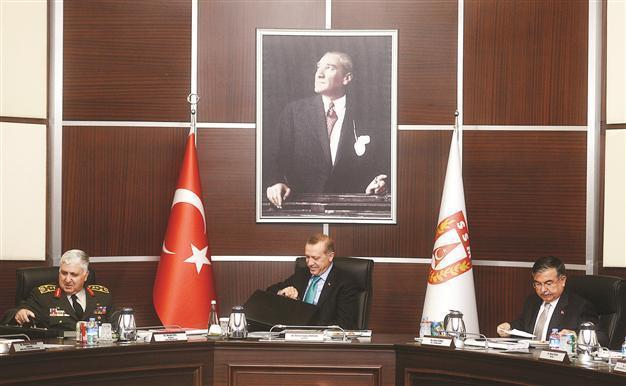Turkey’s China deal on missile system not finalized, says President Gül
ANKARA / WASHINGTON

The Defense Industry Executive Committee, led by Turkish Prime Minister Recep Tayyip Erdoğan (C), has decided to make a contract for the construction of long-range air and anti-missile system had been awarded to China Precision Machinery Export-Import Corporation (CPMIEC). AA photo
Turkey’s deal with China over the construction of a long-range air and anti-missile system is not the final decision, President Abdullah Gül said yesterday.That purchase is not definite. There is a shortlist, and China is at the top of it. We should look at the conditions, but there is no doubt that Turkey is primarily in NATO. These are multi-dimensional issues, there are technical and economic dimensions and on the other hand there is an alliance dimension. These are being evaluated. Turkey needs a defense system,” Gül said while onboard a plane that was en route to Turkey.
Earlier, the United States said on Sept. 28 that it had expressed serious concerns to Turkey over its decision to co-produce a long-range air and missile defense system with a Chinese firm under U.S. sanctions, Reuters reported yesterday.
Turkey, a member of the NATO military alliance, announced on Sept. 26 that that it had chosen the FD-2000 missile defense system from China Precision Machinery Import and Export Corp, or CPMIEC, over rival systems from Russian, U.S. and European firms.
CPMIEC is under U.S. sanctions for violations of the Iran, North Korea and Syria Nonproliferation Act.
“We have conveyed our serious concerns about the Turkish government’s contract discussions with a U.S.-sanctioned company for a missile defense system that will not be inter-operable with NATO systems or collective defense capabilities,” a State Department spokeswoman said on Sept. 28.
“Our discussions on this issue will continue.,” she said.
Some Western defense analysts have said they were surprised by Turkey’s decision, having expected the contract to go to Raytheon Co, a U.S. company that builds the Patriot missile, or the Franco/Italian Eurosam SAMP/T.
Deal worth $4 billion
The initial estimated contract price was $4 billion, but the Chinese offer stood at anywhere between $3 billion to $3.5 billion, although officials did not confirm any figure.
Turkey presently has no long-range air-defense systems. The $4 billion program, dubbed the T-LORAMIDS, is being designed to counter both enemy aircraft and missiles.
About half of Turkey’s network-based air defense radars have been paid for by NATO, and are part of the NATO Air Defense Ground Environment. “Turkey can always decide to build a standalone system. But in that case, abstracting the air defense system from NATO assets would mean that Turkey will lose half of its radar capabilities,” one defense analyst said earlier.
Turkey would need interface data to make its own air defense architecture interoperable with NATO assets, primarily data on the Identify Friend and Foe system. This is top secret and cannot be installed into any Chinese system.
















